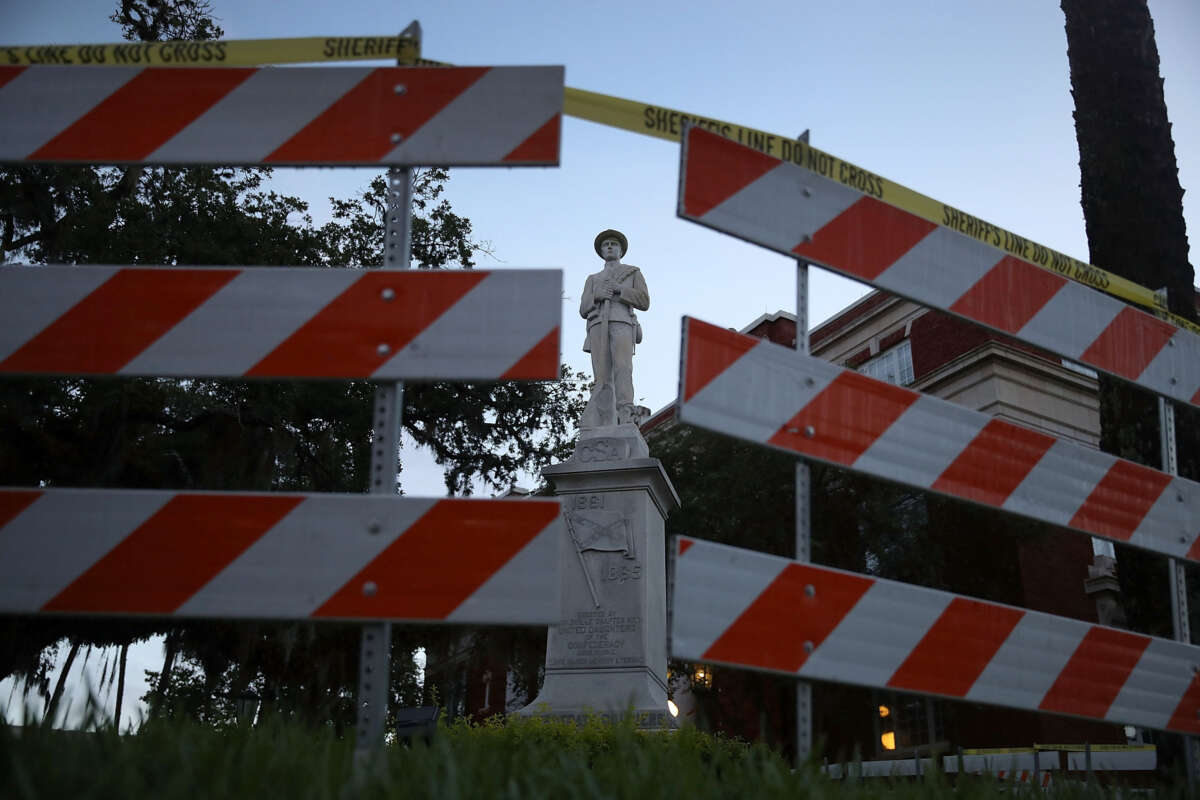Honest, paywall-free news is rare. Please support our boldly independent journalism with a donation of any size.
A proposed bill in Florida, HB-395, would punish cities for removing existing historical monuments and memorials, and would retroactively apply to removals that took place up to five years ago. If passed, the bill would also grant governors the power to remove any local official from office if they voted to remove a monument.
The proposal was introduced on Thursday by state Rep. Dean Black (R-Jacksonville), three years after a Confederate statue was removed from a public park in Jacksonville, which has a large Black population.
“Yeah, I think it’s ridiculous. I believe it’s unconstitutional,” said Wells Todd, an activist with Take ’Em Down Jax, a coalition opposed to symbols of white supremacy in public spaces, in an interview with News4Jax. “We have somebody looking into [this] right now. I think what Dean Black is doing, and other legislators are doing is feeding [in]to their base, and their base here in Jacksonville.”
Last legislative session, the Florida Senate advanced SB 1096, which would have prohibited the removal of memorials related to Confederate figures or events and banned the addition of text on or near monuments to provide historical context. The bill also included “treble damages” — fines three times the actual amount of repair costs — if a person was found guilty of damaging a public monument in the state, including Confederate monuments.
While this bill did not pass the legislature, HB-395 goes further and allows the state to preempt local authority over monument removal and fine “any local elected officials who may be swayed by undue influence by groups who may feel offended or hurt by certain actions in the history of the state or the nation.” Additionally, any public official involved in the removal or damage of the monument would be fined $5,000 or the cost of the removal and replacement of the memorial, whichever is higher. Officials involved in the removal may also be liable for triple the amount required to restore the fixture and could face unspecified “punitive damages.” This law would apply retroactively to “any monuments or memorials that have been removed, damaged, or destroyed on or after January 1, 2017.”
“I want to see them not taken down. The bill has enforcement mechanisms in place to make sure that upon passage, that doesn’t happen anymore,” Black said. “And it’s emphatic, it says that if an elected official votes or permits to allow a historical memorial to be damaged, destroyed or removed, then they can be removed from office.”
While Jacksonville did not play a prominent role in the Civil War, the city adopted public memorials to the confederacy after the war. In a 2020 campaign led by Black activists in the wake of the George Floyd uprisings, Take ’Em Down Jax successfully pressured the city of Jacksonville to remove a 62-foot granite monument of Civil War veteran Charles C. Hemming.
“It was a long time coming,” Todd told the Florida Times-Union. “What those statues stand for and stood for is white supremacy.”
After the deadly 2017 “Unite the Right ”rally in Charlottesville, Virginia, which was organized in opposition to the removal of a Robert E. Lee statue, people across the country pressured their officials to remove monuments glorifying white supremacy and settler colonialism.
“For the torch-wielding fascists there, the removal of these monuments represents not only a threat to white supremacy, but a threat to the existence of white people. The chants of ‘You will not replace us’ and ‘white lives matter’ illustrated this,” Ashoka Jegroo wrote for Truthout in 2017. “And in the name of these symbols of white supremacy, fascists have shown themselves to be more than willing to engage in material, concrete violence.”
While the Florida bill does not directly name the Confederacy, it explicitly defines a military memorial as “including any armed conflict since settlers from other countries came to what is now the United States.”
“This bill would be just another slap in the face to our Black community, which has already endured so much,” Jacksonville Mayor Donna Deegan (D) said after the bill was introduced. “It’s also an unconstitutional overreach that is the latest example of home rule being stripped away from Florida cities.”
Media that fights fascism
Truthout is funded almost entirely by readers — that’s why we can speak truth to power and cut against the mainstream narrative. But independent journalists at Truthout face mounting political repression under Trump.
We rely on your support to survive McCarthyist censorship. Please make a tax-deductible one-time or monthly donation.
